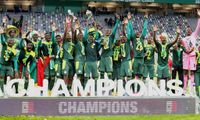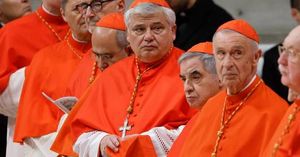Football fans are buzzing with excitement as the 2025 African U17 Cup of Nations, hosted in Morocco, kicks off on March 30 and runs through April 19. This prestigious tournament not only showcases the continent's best young talents but also serves as a qualifier for the U17 World Cup, scheduled for November 3-27 in Qatar. With ten spots available, the stakes couldn't be higher for the participating teams.
As the host nation, Morocco is looking to make a significant impact in the tournament. The national U17 team, coached by Nabil Baha, will begin their campaign at midnight on March 31, facing off against Uganda at the El Bachir Stadium in Mohammedia. Baha's squad is determined to write a golden chapter in Moroccan football history, aiming for at least a place in the knockout stages, which would secure their qualification for the World Cup.
Morocco's group stage is promising, featuring Uganda, Tanzania, and Zambia. Baha's players will need to perform exceptionally well to advance, especially considering the relatively favorable draw compared to other groups. Group B, for example, includes heavyweights like Burkina Faso and Cameroon, making Morocco's path appear less daunting.
“This is a crucial tournament for us, and we’re well-prepared,” Baha stated in a recent press conference. “We’ve trained hard and participated in several competitions leading up to this moment. Our players have matured technically, and we believe we can achieve great things.”
The Moroccan squad boasts several standout players, including Ibrahim Rabbaj, a 16-year-old talent who has drawn comparisons to Lionel Messi. Nicknamed the "Messi of Chelsea," Rabbaj is expected to shine on this big stage. In youth competitions, he has impressive stats, having scored 52 goals and provided 60 assists in just 40 matches. His decision to represent Morocco over England, where he was born, adds to the narrative of his commitment to his new national team.
“I’m excited to play for Morocco, and I want to show what I can do on the field,” Rabbaj said. “This tournament is an opportunity for us to prove ourselves and aim for the World Cup.”
Besides Rabbaj, the team includes Hamza Bouhadi, the captain, who plays for FUS de Rabat. The combination of skilled players and a supportive coaching staff creates a hopeful atmosphere within the Moroccan camp.
Morocco's opening match against Uganda is set to draw significant attention, not only because of the stakes involved but also due to the historical context. The last time Morocco hosted a major tournament, they faced challenges that they hope to overcome this time around. Baha is keen to ensure that his players manage the pressure of playing at home effectively.
Tickets for the matches are affordably priced at 10 or 20 DH, allowing fans to witness two matches for the price of one. This accessibility is expected to fill the stadiums and create an electric atmosphere, particularly during Morocco’s matches.
As the tournament progresses, the format will see the top two teams from each group advance to the quarter-finals, while the third-placed teams will have a chance to qualify through play-offs. The excitement surrounding the tournament is palpable, with fans eager to see which teams will emerge victorious and secure their spots in the World Cup.
In Group A, alongside Morocco, the competition includes Uganda, Tanzania, and Zambia, while Group B has Burkina Faso, Cameroon, South Africa, and Egypt. Group C features Senegal, Gambia, Somalia, and Tunisia, and Group D includes Mali, Angola, Ivory Coast, and the Central African Republic. Each group promises intense matches as teams vie for a place in the knockout stages.
The tournament's opening day will also see Central African Republic face Côte d'Ivoire, adding to the excitement of the event. The Central African team, led by coach Edwin Titalom, will look to upset the odds in their matches against formidable opponents.
With the competition underway, all eyes will be on Morocco as they seek to capitalize on their home advantage and the support of their fans. The young players are poised to showcase their skills, and the tournament is expected to be a launching pad for future stars of African football.
As the matches unfold, the atmosphere in Morocco will be charged with anticipation, and the hopes of a nation rest on the shoulders of these young athletes. Will they rise to the occasion and secure their place in football history? Only time will tell, but the excitement is certainly building as the 2025 African U17 Cup of Nations gets underway.







